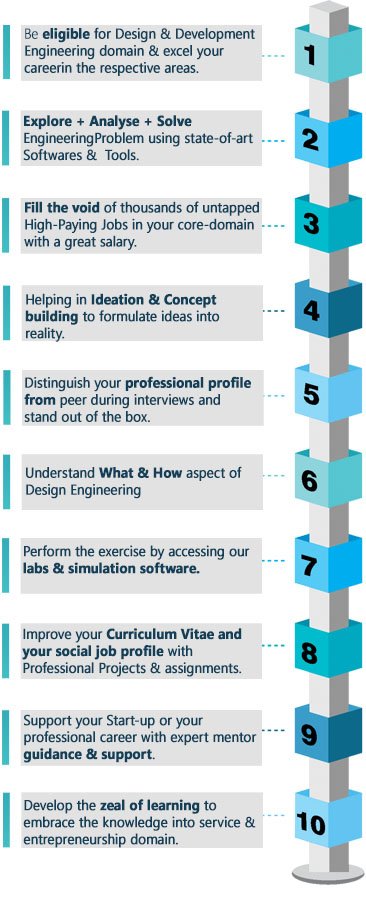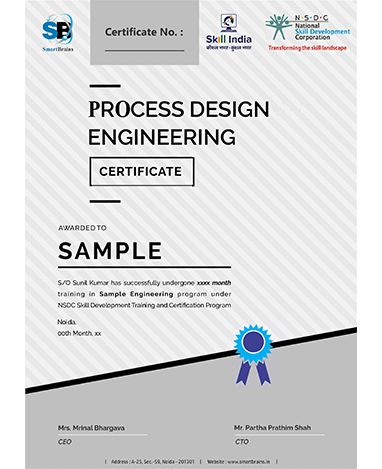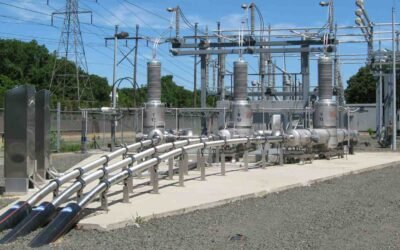About the Program
The objective of this course is to provide the candidates the Detail knowledge and skills in Industrial Automation Design, Commissioning, Operations & Maintenance discipline to facilitate faster learning curves while on the job.
A Programmable Logic Controller (PLC), is simply a special computer device used for industrial control systems. They are used in many industries such as oil refineries, manufacturing lines, conveyor systems and so on. Where ever there is a need to control devices the PLC provides a flexible way to “software” the components together.
The goal of this course is to provide delegates the Detail knowledge and skills into Design, Engineering, Construction, Commissioning operation & Maintenance in the field of Industrial Automation.
Learning objective
- Review Basics of Electrical & Electronics
- Electrical Safety
- An Introduction to Programmable Logic Controller
- Fundamentals of PLC hardware
- PLC I/O’s (Analog and Digital)
- PLC Memories
- Fundamentals of PLC software
- Ladder Logic for simple Digital Functions
- Build PLC panel
- Wiring Drawings of Control Panels
- General commissioning
- Testing and upgrading of the automation system
- Safety Programmable Systems
- Troubleshooting and maintenance of PLC
Program Highlights

About The Course

Course Modules
- Introduction to PLC
- Introduction and brief history of PLCs, alternative control systems – where do PLCs fit in? Why PLCs have become so widely accepted, lingering concerns about PLCs
- Fundamentals OF PLC hardware
- Block diagram of typical PLC
- PLC processor module
– memory organization
– Programming devices
– Processors, power supplies - Memory systems and I/O interaction
- Digital and Analog I/O systems
– The special function I/O and serial communication interfacing
– Power supplies.
- Fundamentals OF PLC software
- Methods of representing Logic, Boolean Algebra, instruction code and graphical presentation
- Fundamental ladder logic instruction set
- Comparison of different manufacturers, memory and data representation and instruction code
- Using ladder LOGIC for simple Digital functions
- The basic rules, comparison of relay ladder diagrams, the concept of the ‘scan’ and how to apply it, infinite fan- out, contact ‘normal’ states, positive and negative logic
- Basic boolean functions
- The usefulness of Demorgan’s Law using registers (words)
- Number systems, timers, types of register data, counters, bit shift and rotate, table functions and register (matrix) logic functions
- SCADA/HMI System Development
- SCADA Basics
- SCADA System Hardware
- SCADA Systems Software
- SCADA Network Security
- Wide Area Network (WAN) technologies for SCADA
- Human Machine Interfaces (HMIs)
- HMI configuration
- Design and layout
-
- Alarming and reporting philosophies
- Alarm system design
- Troubleshooting and maintenance SCADA & HMI
- Distributed Control System
- Introduction to DCS
- Review of sensors, instrumentation, and process control systems
- Control Algorithms
- Proportional (P)
- Proportional and Integral (PI)
- Proportional, Integral, and Derivative (PID)
- Distributed Control Systems: Introduction
- Overview, Features, Advantages, Where used
- Functions, Architecture, I/O, components,
- Hardware, software, system interfacing
- supervisory control and direct digital control
- Supervisory Control and Data Acquisition (SCADA) – a brief overview
- DCS Configuration and Networking
- Distributed Control Systems: Structure and Configuration
- DCS block diagrams, components, architecture, redundancy concepts
- DCS hardware configuration
- DCS Hardware & Software Internals
- Process variables, software variables, tags
- Human Machine Interface (HMI)
- Alarms, Trends
- Databases
- Basic DCS Controller Configuration
- Sequential Controllers for Batch Processing
- Controllers for Continuous Processes: Function Blocks
- Hierarchical Structure of control systems: ISA-95
- Data Communications and Networking
- Signal Transmission
- Physical Network Structures
- Logical Network Structures
- Communication Standards
- Fieldbus Operation: Foundation Fieldbus, Profibus
- Wide Area Network (WAN) communications: Modbus
- Control in the Field (CIF)
Course Certificates
SmartBrains is associated with The National Skill Development Corporation (NSDC) as the Training and Certification partner for various job oriented training programs across various sectors including Oil & Gas, Power, Renewable Energy, Hydrocarbon, IT & ITs, Electronics, Telecom, Agriculture, Life science etc. offering assessment based Training & certifications for a gamut of job profile.
Who should join?
- Working professionals in Domains: Site Engineering, .Construction & Commissioning operation & .Maintenance, Technicians in Automation Engineering Field.
- Students (Electrical, Electronics & Instrumentation Engineering, Diploma in Electrical, Electronics & Instrumentation Engineering) who want to develop their career in Automation Engineering.

For Corporate queries
A-25, Sector-59, Noida (UP),India
Pin Code-201301
Connect with Program Advisor
training@smartbrains.com
+91 8955560560 | +91 9891108700
www.smartbrains.com
Nodal Centers
Noida, Dehradun
Guwahati, Pune
Course Features
- Lecture 0
- Quiz 0
- Duration 2/6 Months
- Skill level All levels
- Language English
- Students 0
- Assessments Yes






